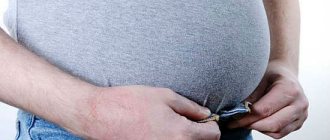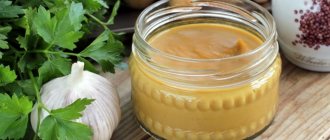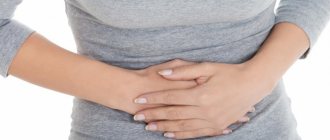Increased gas formation is a symptom of many pathologies of the digestive system. In this case, a person may complain of bloating, pain and discomfort.
Often, increased gas formation appears sporadically and quickly passes, but in some cases this disease poisons the patient’s life for years. The causes of bloating and gas are often quite unobvious.
What is increased gas formation?
Bloating brings considerable discomfort
Increased gas production is also called flatulence. In medicine, flatulence is understood as a symptom of gastrointestinal diseases, characterized by excessive gas production in different parts of the intestine.
Most often, increased gas formation is associated with the activity of intestinal bacteria. Overfilling of the intestines with gas is accompanied by bloating, pain and discomfort.
Flatulence can be of two types: with the release of gas and without the release of gas. The first type is characterized by active release of gas from the rectum. The second type is characterized by increased bloating.
Causes of constipation in adults
Eating habits
An unbalanced diet is the most common etiological factor for decreased bowel movements.
Constipation is caused by a lack of fibrous foods and plant fiber in the diet, which contribute to the formation of stool of normal consistency and facilitate its movement through the intestines. The basis of the diet of most people is easily digestible carbohydrates (white bread, premium cereals, sweets), animal proteins and fats. These reasons contribute to a decrease in intestinal motility, as a result of which feces stagnate in the colon. Adults complain of chronic constipation; stool is observed every 2-3 days. This is characterized by painful sensations, and you have to strain a lot when emptying. There is often a feeling of incomplete bowel movement and discomfort in the rectal area.
Psychogenic factors
According to medical statistics, constipation in adults, caused by psychological discomfort, accounts for 13% to 23% of all cases of defecation disorders. Stool is delayed for various reasons - from a simple quarrel with a loved one or colleague to severe stress and depression. A short-term (1-2 days) absence of bowel movements is possible after a change of environment, on a business trip or during a vacation.
Lifestyle
The process of defecation is a partially voluntary reflex act; if desired, a person can suppress the urge to visit the toilet. The most physiological stool is in the morning, but adults living in a constant rush often do not have time to empty their bowels. Gradually, to form the urge to defecate, a larger amount of feces is required in the rectum, so the frequency of bowel movements decreases.
Chronic constipation is typical for adults leading a sedentary lifestyle. Their pelvic floor muscles weaken, and intestinal motility becomes sluggish, making defecation difficult. Due to a long stay in the rectal cavity, stool loses water, becomes dry and lumpy, and going to the toilet is accompanied by painful sensations. Lack of stool associated with intestinal atony occurs in patients who are on bed rest.
Pregnancy
The main causes of constipation in pregnant women are the mechanical pressure of the enlarged uterus on the intestines and the effect of the hormone progesterone. The symptom worries a woman from the second half of pregnancy, and reaches its greatest severity at 35-37 weeks, when the uterus drops slightly and strongly compresses the large intestine. Pregnant women are afraid to strain too much during bowel movements so as not to increase the tone of the uterus, so stool is sometimes delayed for 3-4 days.
Irritable bowel syndrome
This functional disorder affects on average 10-15% of the adult population, and the most pronounced manifestations begin after 30 years. A person notices periodic bowel movements such as constipation, accompanied by abdominal pain. Symptoms are more often observed in the morning: 30-40 minutes after waking up, severe abdominal cramps and the urge to defecate develop, but emptying does not occur. Sometimes constipation is replaced by loose stools.
IBS is characterized by a chronic course, the duration of the main symptoms is more than 6 months. Patients complain of pain in the anus during defecation, difficulty in bowel movements, and the need for manual assistance to remove stool from the rectum. The frequency of bowel movements without taking laxatives is less than 3 times a week. If such signs are present, a doctor's consultation is required to rule out more severe somatic causes of constipation.
Rectal lesion
With hemorrhoids and anal fissures, patients experience severe pain during the passage of feces, so they try to consciously suppress the urge to expel feces and reduce the amount of food they eat. Constant constipation is also caused by a reflex rectal spasm in response to the inflammatory process, due to which the feces accumulate for a long time, acquiring a rocky density.
As a rule, independent defecation is impossible, constipation lasts up to 7 days. In the stool that appears after taking laxatives or giving an enema, inclusions of pus and blood are visible. Stool retention worsens the course of proctological diseases and provokes further damage to the mucous membrane. In the initial stages of hemorrhoids, spontaneous bowel movements persist, and bright red blood is visible on the surface of the stool.
Intestinal obstruction
Long-term constipation in adults occurs when there is obstruction of the intestinal lumen and the inability to move feces through the intestines. With intestinal obstruction, defecation is completely absent, against the background of which a sharp diffuse pain in the abdomen develops, flatulence, in which gases do not pass away. A painful, fruitless urge to excrete feces may be disturbing. The most common causes of mechanical intestinal obstruction:
- Intestinal hernias
. When the intestinal area gets into the hernial sac in adults, chronic constipation occurs. Gradually, the intervals between bowel movements lengthen. The symptom is accompanied by dull pain and heaviness in the abdomen. Unpleasant sensations intensify after physical activity or heavy lifting. - Polyps
. These benign formations, as they increase in size, clog the intestinal lumen and lead to stool retention in adults. At the beginning of the disease, independent stool is possible, but with large polyps, defecation occurs only after an enema or medications. - Cancer
. Colon tumors grow quite rapidly, they delay the passage of stool and cause chronic constipation. There is also constant pain in the lower abdomen radiating to the anal area. Dry lumpy or ribbon-like feces with inclusions of blood are released.
Inflammatory diseases of the gastrointestinal tract
Long-term constipation occurs with various intestinal lesions with primary involvement of the large intestine - colitis, enterocolitis. First, an adult experiences abdominal pain, rumbling and flatulence, and later stools begin to linger. In this case, tenesmus is possible, after which a small amount of mucus or pus is released from the anus.
Missing stool is one of the signs of ulcerative colitis. With UC, constipation in adults is accompanied by dyspeptic symptoms, pain and cramps, which are more pronounced in the lower abdomen. The disease is chronic; alternating periods of exacerbation and prolonged constipation are provoked by the following reasons: errors in diet, emotional shock, taking antibiotics or hormonal drugs.
Damage to the pelvic organs
In women, delayed bowel movements are often caused by pathological processes in the uterus and appendages. In acute oophoritis and salpingitis, sharp pain occurs in the lower abdomen, causing spasm of the anal sphincters. As a rule, there is no defecation. Constipation continues for several days, sometimes spontaneous bowel movements are possible, but more often it is necessary to resort to enemas. Abnormal bowel movements persist throughout the entire period of acute inflammation of the reproductive organs.
Peripheral neuropathies
The symptom occurs in diseases of the spinal cord in which the distal sacral segments are damaged - transverse myelitis, poliomyelitis, trauma. There is stool retention without the urge to defecate. The accumulation of feces and absorption of rotting products into the bloodstream causes a state of intoxication. Constipation in adults occurs with Hirschsprung's disease, which occurs with damage to a small area of the colon.
Endocrine pathology
With hypothyroidism in adults, prolonged constipation occurs for no apparent reason, which occurs without severe pain or other dyspeptic disorders. Rare passage of feces is associated with a decrease in intestinal motility; when trying to defecate, a person needs to strain very hard and help himself with his hands. Persistent constipation is seen in diabetic neuropathy, especially type 2 diabetes.
Intoxication
Prolonged absence of stool is provoked by poisoning with salts of heavy metals. Constipation is most typical for occupational lead intoxication. The absence of bowel movements is accompanied by severe abdominal pain and increased body temperature. Constipation is also a concern with uremia and liver failure - conditions that are characterized by endogenous intoxication.
Complications of pharmacotherapy
Most often, constipation develops due to prolonged abuse of laxatives. Over time, the natural reflex act responsible for normal bowel movements is suppressed, and the urge to stool is absent. There are other medicinal causes of long-term constipation in adults:
- Analgesics
: opioids, some non-steroidal anti-inflammatory drugs. - Psychotropic drugs
: antidepressants, anticonvulsants and antiparkinsonian drugs. - Microelements
: iron supplements, antacids with calcium and magnesium, aluminum salts of phosphoric acid (phosphalugel). - Antihypertensive drugs
: beta blockers, diuretics, calcium channel blockers.
Rare causes
- Central nervous system diseases
: multiple sclerosis, brain tumors, Parkinson's disease. - Systemic connective tissue damage
: scleroderma, dermatomyositis, systemic lupus erythematosus. - Metabolic disorders
: porphyria, hypercalcemia, hypokalemia.
Intestinal gas
Gas formation in the intestines is a normal physiological process. The greatest contribution to this process is made by intestinal bacteria, which produce gas at different stages of metabolism.
Undigested food products enter the human large intestine, which feed the bacteria. The normal microflora of the large intestine produces a moderate amount of gas, but if the balance of bacterial colonies is disturbed, flatulence may develop.
Intestinal gases can consist of carbon dioxide, hydrogen, methane, nitrogen and sulfur dioxide. The latter chemical component gives the gas an unpleasant odor. This gas is typically a byproduct of the enzymatic breakdown of carbohydrates by bacteria.
Self-remediation methods
When you know why farting may occur, you need to take measures to eliminate the problem and understand how to get rid of it. The easiest way to solve the problem is with aerophagia. Here is the treatment - you just need to change your eating behavior, stop talking while eating, eat food in smaller pieces and chew it better.
If the problem is that you eat one of the foods that makes you fart/fart due to the fact that it is not quite adequately accepted by your body, just reconsider your diet. Limit the consumption of those products that were indicated in the points above. Also try to reduce (but not completely eliminate) the amount of easily digestible carbohydrates, such as baked goods, sugar, and protein foods, such as lamb, goose, pork and mushrooms. Then the problem should gradually recede, you will stop farting so often.
Also try to get enough sleep, devote time to physical activity, and so on. Better your health means less chance of the problem getting worse and less need for treatment.
Causes of bloating and gas
Bloating is common in infants
Bacterial intestinal disorders are just one condition for excess gas production.
For flatulence to occur, it is also necessary to consume certain foods that provoke the activity of intestinal microflora.
Bacteria produce gas during the digestion of residual polysaccharides (starch, cellulose), proteins and some simple carbohydrates.
There are two important features of the appearance of flatulence. If pathogenic bacteria are active in the colon, then for flatulence to occur, undigested food debris must enter this section of the intestine.
If pathogenic bacteria have colonized the small intestine, eating even small portions of provoking foods is sufficient.
The first feature may be associated with certain digestive disorders in which incomplete decomposition and absorption of food occurs in the upper intestines (for example, with pancreatic insufficiency).
The following video will familiarize you with the reasons for increased gas formation:
Possible complications
Despite the apparent innocence of the disease, loud rumbling in the stomach can lead to the development of serious complications. The table below shows options for symptom progression depending on the existing disease:
| Pathology | Possible complications |
| Dysbacteriosis | Development of inflammation, digestive disorders. |
| Helminthiasis | Lack of nutrients, chronic bleeding, anemia. |
| Constipation | Intestinal distension, fecal impaction. |
| Inflammatory processes | Impaired food processing, nonspecific symptoms of infection, dehydration, diarrhea. |
| Tumors | Metastasis, intestinal obstruction. |
| Strictures | Partial blockage of the lumen. |
Depending on the form and characteristics of the course of the underlying pathology, other types of complications may occur: intestinal perforation, sepsis, cachexia.
In the vast majority of cases, the symptom in question is a consequence of disruptions in the microflora and goes away on its own over time, without medical intervention. However, the risk that rumbling is caused by serious and dangerous diseases cannot be ignored. If you constantly have unusual sounds from the abdomen, you should consult a doctor for a diagnosis and treatment.
Ways to get rid of bloating
Flour products can provoke flatulence
Compliance with preventive measures will help significantly alleviate the condition. You should avoid provoking foods. Foods with small amounts of simple carbohydrates will not cause flatulence.
You need to add dried fruits, lean meat, nuts and eggs to your diet. The most harmful foods are confectionery, fruit juices, soy, cauliflower and Brussels sprouts.
Drinks high in fructose can also cause bloating. It is also very important to understand that each patient has individual provoking foods, so it is necessary to independently determine a safe diet.
Diet-related reasons
To understand how to stop farting frequently or even constantly, you must first understand what causes excessive flatulence. And most often it’s about the food a person eats.
The main reason that a person begins to fart too often is the consumption of foods that provoke increased gas formation. These may include:
- Dairy products. They contain lactose, which most people cannot digest normally.
- Carbonated drinks. Kvass, beer, champagne, and also lemonades increase flatulence. It's all about the gases contained there, as well as the yeast. Lots of such drinks - and the situation gets worse.
- Legumes. Peas and similar products increase the amount of hydrogen produced during digestion, which makes the problem worse.
- Products with a lot of coarse fiber. Apples, brown bread, potatoes, cabbage, radishes, radishes and similar products, when consumed in excessively large quantities, can lead to increased gas formation.
- Products in incorrect combination. Sometimes individual foods, even if you eat a lot of them, may not cause any problems for a person, but in combination they can complicate the digestion process, causing the amount of gases released to increase significantly. This, for example, is white bread with soup, potatoes with sausages and a number of other equally negative combinations.
Home methods to get rid of flatulence
Folk remedies can help
If bloating cannot be avoided, you can alleviate the condition using traditional medicine. Effective means:
- A decoction of dill seeds. This product contains natural carminative components that improve the evacuation of gas from the intestines. A decoction or tincture of dill seeds can be purchased at a pharmacy.
- Parsley. It is also a fairly common remedy for bloating. You can pour warm water over the parsley and leave for an hour.
- Mint and chamomile. These herbs improve the functional state of the digestive tract and alleviate flatulence. The products can be consumed in the form of tea, tinctures or decoctions.
- Lime juice. To prepare the product, add one tablespoon of juice to a glass of water. The product can be drunk several times a day to relieve the condition.
Not all folk remedies may be effective for a particular patient, so it is necessary to test different ways to alleviate the condition.
Diagnosis of diseases
The following methods for detecting intestinal pathology are used in medical institutions:
- Laboratory tests (general analysis of urine, blood, biochemistry, coprogram).
- Hardware (ultrasound, virtual colonoscopy).
- Instrumental (gastroduodenoscopy, sigmoidoscopy).
The above invasive procedures are uncomfortable for the patient. Therefore, their implementation is indicated only in the presence of symptoms of intestinal damage. These types of studies are not prescribed for preventive purposes.
Video: How to get tested. Colonoscopy
When to see a doctor?
Chronic flatulence may be associated with dangerous pathologies that require medical supervision. You should consult a doctor if the following symptoms appear:
- Significant weight loss.
- Pale skin, constant weakness, dizziness, loss of appetite (symptoms of anemia).
- Constant diarrhea.
Diagnostics can reveal the most unexpected causes of pathological conditions. Thus, the causes of bloating and gas are usually related to the characteristics of the intestinal microbiome.
How to avoid becoming a balloon? We get rid of gas formation in the intestines.
Worried about bloating? What to do and are there any proven means to solve this problem?
We asked Aleksey Viktorovich Antipov, a gastroenterologist at Clinic Expert Tula LLC, to talk about a condition such as flatulence and its possible causes.
- Alexey Viktorovich, how can I explain in simple language, understandable even to a first-grader, what kind of problem this is – flatulence?
Surely any person throughout his life has experienced a feeling of bloating, increased accumulation of gases in the intestines. This is flatulence.
- Why does the stomach swell?
The basis is insufficient digestion of the food eaten. This may be due to the very nature of the product (for example, legumes, sauerkraut), errors in nutrition, or to some problems or diseases of the gastrointestinal tract. As a result, food reaches the large intestine in an insufficiently digested form. Here the intestinal microflora begins to influence it, which causes the processes of fermentation and decay. As a result, a larger than normal amount of gases is formed.
It should also be taken into account that gas in the intestines may be in the form of a kind of “foam”. Once formed, it covers the intestinal mucosa, thereby further impairing the absorption of substances and, thus, aggravating the process of gas formation.
-Can flatulence be called a disease?
No, flatulence is a symptom.
- What diseases accompany flatulence?
It can be a symptom of many pathologies. First of all, these are diseases of the digestive system: gastritis, pancreatitis, enteritis, colitis, cholecystitis, cholelithiasis, excessive growth of bacteria in the intestines, dysbiosis, intestinal obstruction, intestinal tumors. Flatulence also occurs with so-called aerophagia (increased swallowing of air during eating), neurosis and some other diseases.
- Alexey Viktorovich, what is included in the diagnostic examination of patients suffering from increased gas formation in the intestines?
Typically, an ultrasound of the abdominal cavity, a general and biochemical blood test, gastroscopy, colonoscopy, and stool tests (general, occult blood, and bacteria) are performed.
How to prepare for an abdominal ultrasound? Ultrasound diagnostics doctor says
LLC "Clinic Expert Orenburg" Poskrebysheva Anna Viktorovna
It should be remembered that the choice of one or another research method is made only by the attending physician based on the specific clinical situation of the patient.
- What to do if a strong accumulation of gases in the intestines does not allow you to live peacefully? Is increased flatulence treatable?
If gas formation has not bothered you before, you should consult a gastroenterologist to find out its cause.
Flatulence, of course, can be treated. However, pills for bloating and gas are not a complete solution, but rather a situational solution to the problem. They can eliminate flatulence “here and now,” but, unfortunately, they will say nothing about its original source. In addition, self-medication has certain risks, and therefore the issue of prescribing medications should be decided only by a doctor.
In addition to the examination, you also need to think about the nature of your diet. Many foods themselves can contribute to increased gas formation and must be excluded from the diet. Your doctor will help you choose the right diet.
You can find out the cost and make an appointment with a gastroenterologist in your city here
(Attention: the service is not available in all cities!)
- Are there traditional methods for treating flatulence? What is their effectiveness?
In our practice, we use only treatment methods with proven effectiveness. I am not aware of any folk methods that meet this criterion, so it is difficult to say anything in this regard. I can only note that in some cases, following advice found, for example, on the Internet, can lead to unfavorable results. So, if a person starts taking, say, a carminative or activated carbon, smecta, this can temporarily reduce or eliminate existing flatulence. But on the other hand, this same period spent on self-medication may be missed, since the cause of bloating may be quite serious.
- Please tell us what can and cannot be eaten during flatulence? Is a special diet prescribed to patients with increased gas formation in the intestines?
Of course, following a diet will yield positive results.
Fermented milk products, porridge (buckwheat, millet), wheat bread made from coarse flour are recommended. Vegetables (in particular, carrots, beets), fruits, and lean beef should be consumed boiled.
In an adult, it is recommended to exclude from the diet foods that cause gas formation in the intestines. This list includes cabbage, grapes, sorrel, gooseberries, legumes, black bread, kvass, beer, sparkling water.
Other related articles:
When is an intestinal MRI prescribed and what does it show?
Have you prescribed a gastroscopy? We undergo diagnostics WITHOUT fear
Colonoscopy of the intestines - is it scary?
For reference:
Antipov Alexey Viktorovich
Graduate of the Medical Institute of Tula State University in 2011.
In 2012, he completed an internship in the specialty “Therapy”.
In 2013, he completed postgraduate professional retraining in the specialty "Gastroenterology", and in 2015 - in the specialty "Endoscopy".
Currently working at Clinic Ekpert Tula LLC as a gastroenterologist.
If it rumbles at night, what is it?
Are you bothered by noise at night? There are several reasons: There was probably a long break between dinner and bedtime. This is not dangerous.
- If rumbling is observed sometimes, then pay attention to the amount of food eaten at night.
- The stomach has difficulty digesting what it eats, so it reminds you of it by loud rumbling.
- If noises occur when you lie on your left side, then most likely you have gastritis.
- In case of strong excitement or stress, sounds will also be heard on the left.
- Night rumbling may also indicate the presence of colitis, pancreatitis, and dysbacteriosis. Symptoms can be controlled if treatment is started immediately.
Why do gases begin to accumulate in the stomach?
The most common cause of gas accumulation and bloating is poor diet and food intake. At the moment when a person chews food, a large amount of excess air enters the body, which then accumulates in the stomach and begins to bubble. Eating too quickly or “eating” while moving can cause discomfort. Also, with regular use of chewing gum, gastric juice is formed in the stomach, which must process food, but nothing enters it except air.
There can be a large number of reasons why gases are formed. Products such as potatoes, cabbage, pears, beans, grapes, lemonades and other carbonated drinks can cause flatulence. Therefore, it is best not to eat them, as well as fried foods, for a while.
But the causes of gas may not always be harmless. If you constantly feel such discomfort and your stomach hurts badly, then this may hide a gastrointestinal disorder or diseases such as gastritis, dysbiosis, colitis or even an ulcer. In this case, it is necessary to urgently contact a gastroenterologist and undergo a full course of examination.
Why does the vagina fart
It can happen to anyone who has a vagina, and it can appear at any age. Yet this vaginal noise often occurs during intimate moments. As you age or after you have children, your vaginal canal will widen somewhat. It loses its former tightness. During strenuous exercise, sexual intercourse or any other activity such as coughing, sneezing, squatting, etc. these free walls expand, and a certain amount of air, like a pump, is drawn from the outside into the vaginal canal and collected there. When the vaginal walls contract back, this air rushes out through the vagina, which is accompanied by the characteristic sounds of “farting” or “snoring.” During sexual intercourse, this often happens in the knee-elbow position and when the woman is in the “cowgirl” position.
The pelvic floor plays a key role in this gig because the pelvic floor musculature is capable of constricting the vagina and vaginal opening. We know that vaginal flatulence after childbirth is common and occurs more often after repeated vaginal births. It also affects women of any age and after cesarean section, hysterectomy or perineal surgery.
Causes of farting vagina
The main reasons for increased vaginal noises are a weak or tight pelvic floor, prolapse and flexion of the uterus in combination with weak anogenital muscles, this is the so-called vaginal relaxation syndrome. Because the pelvic floor responds to our hormones, some women experience more farts during ovulation or menstruation.
A contracted (spasmodic) pelvic floor can act like a suction to draw air into the vagina, and then like a whistle to force the trapped air out with a slower, higher-pitched sound. Remember, a tight pelvic floor acts exactly the same as a weak pelvic floor because it often cannot relax or contract properly. A weak fundus allows more air through and then releases it out with a fast, deep sound as intra-abdominal pressure increases due to lack of contraction control.
Since this air mass does not come out of the butt, the lower intestine, it does not have the unpleasant smell of hydrogen sulfide. So, queefing is normal and there is nothing directly bad for your health to have vaginal flatulence. However, most people find the sounds of vaginal farting during and after sex to be uncomfortable and want to know how to stop doing it and get rid of queefing faster.
If "vaginal gas" smells...
If you experience air emissions from the vagina with an odor like from the anus, get examined by a gynecologist and possibly a proctologist. It is possible that there is a rectovaginal fistula, that is, an air leakage channel in the vaginal wall connecting it to the rectum. Such conditions often arise as complications after surgery, traumatic childbirth, or trauma to the anogenital area. Early detection and treatment are important to prevent infections in the vaginal area. Surgery will help get rid of the problem.










